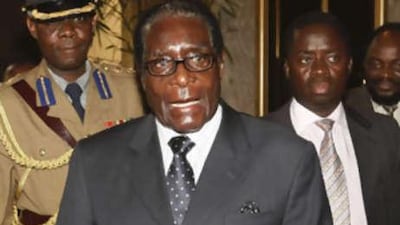HARARE // Zimbabwe's opposition leader said yesterday that four days of "intense" negotiations have failed to break the deadlock in power-sharing talks and called for intervention by regional and African leaders. Morgan Tsvangirai addressed reporters after talks with the president, Robert Mugabe, ended late yesterday without resolving the impasse that has left Zimbabwe rudderless. The former South African President Thabo Mbeki has been mediating talks since Tuesday. Mr Mbeki brokered a Sept 15 deal between Mr Mugabe and Mr Tsvangirai to form a unity government. The opposition narrowly won the March parliamentary elections. But the formation of the new government has been delayed over disagreements on the allocation of Cabinet posts. The opposition has accused Mr Mugabe of trying to hold onto too many key posts. "Regrettably, after four days of intense negotiations we have failed to agree on the first key issue which is the allocation of key portfolios and therefore a deadlock has been declared," Mr Tsvangirai said. Mr Mugabe, who left the Harare hotel where talks have been taking place a little later, did not seem downbeat about the outcome. "It (the discussions) went well ... in the wrong direction," he said, adding that his party would make a detailed statement today. Leaving some time later, Mr Mbeki struck a note of optimism and said talks had not failed. "I wouldn't say there is a deadlock," he said. "The negotiations are continuing." He said the parties would attend a meeting of the Southern African Development Community in Mbabane, Swaziland on Monday to report on progress in the negotiations. Mr Mbeki praised the leaders for their commitment in trying to reach an agreement and said a solution to their differences could be found. " This matter should be resolved as a matter of urgency," he said. Mr Mbeki was expected to fly out of Zimbabwe in the early hours of this morning. Under the deal signed, Mr Mugabe's party was to have 15 Cabinet posts, Mr Tsvangirai's 13 and the minor opposition faction led by Arthur Mutumbara was to have three. Last weekend Mr Mugabe unilaterally claimed the most powerful posts for his own party in a move widely condemned as power-grabbing. Mr Tsvangirai said yesterday that the parties needed to embrace the "principle of equitable power-sharing" if a new government was to work. He said proposals presented by Mugabe's ZANU-PF party were not "equitable" and therefore not acceptable to his Movement for Democratic Change. "We are concerned there is an attempt to reduce the MDC to a meaningless position in the coalition government," he said. He called on SADC and the AU to help in "crafting a sustainable way forward" and said he hoped a meeting of the regional security organ on Monday would address the crisis. "We remain committed to the political agreement and now call on the guarantors and underwriters to assist in the establishment of an equitable and acceptable government which reflects the will of the people of Zimbabwe," he said. While there had been reports this week that Mr Mugabe was prepared to compromise, talks stalled over the allocation of the finance and home affairs ministries. The home affairs ministry controls the police, which the opposition accusing of condoning political violence by police and state agents against its supporters. On leaving the hotel yesterday, Mutumbara gave some insight as to how the talks had broken down. He said parties had initially agreed to give the minister of finance to the opposition and that the home affairs ministry would be shared between the two parties on a rotational basis. However, this agreement later failed, he said. Without a political agreement, the economic and humanitarian crisis in Zimbabwe has deepened. Inflation is at 231 million per cent and the UN estimates that 45 per cent of Zimbabwe's population, or 5.1 million people, will need food help by early 2009. Politicians and generals who have long depended on Mr Mugabe's patronage are believed to be balking at losing their jobs. Mr Tsvangirai, too, is under pressure. The international community is unlikely to unlock much-needed aid and investment if Mr Tsvangirai is seen as giving up too much, and his supporters at home already are worried he erred fatally by allowing Mr Mugabe to retain any power.
*AP

